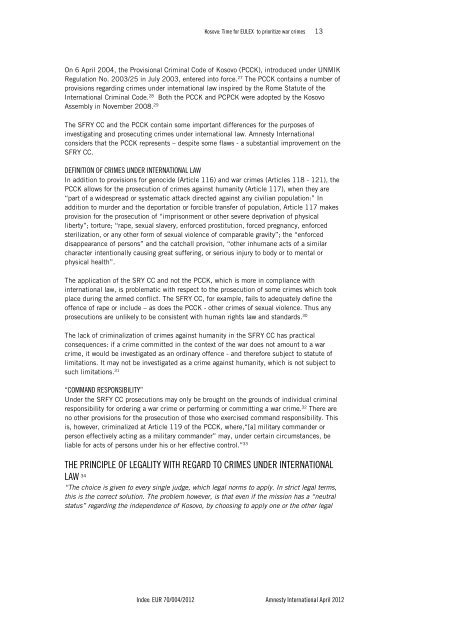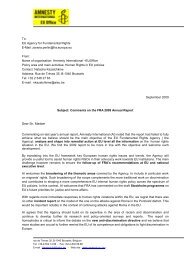Time for eULeX To prioriTize war crimes - Amnesty International ...
Time for eULeX To prioriTize war crimes - Amnesty International ...
Time for eULeX To prioriTize war crimes - Amnesty International ...
You also want an ePaper? Increase the reach of your titles
YUMPU automatically turns print PDFs into web optimized ePapers that Google loves.
Kosovo: <strong>Time</strong> <strong>for</strong> EULEX to prioritize <strong>war</strong> <strong>crimes</strong> 13<br />
On 6 April 2004, the Provisional Criminal Code of Kosovo (PCCK), introduced under UNMIK<br />
Regulation No. 2003/25 in July 2003, entered into <strong>for</strong>ce. 27 The PCCK contains a number of<br />
provisions regarding <strong>crimes</strong> under international law inspired by the Rome Statute of the<br />
<strong>International</strong> Criminal Code. 28 Both the PCCK and PCPCK were adopted by the Kosovo<br />
Assembly in November 2008. 29<br />
The SFRY CC and the PCCK contain some important differences <strong>for</strong> the purposes of<br />
investigating and prosecuting <strong>crimes</strong> under international law. <strong>Amnesty</strong> <strong>International</strong><br />
considers that the PCCK represents – despite some flaws - a substantial improvement on the<br />
SFRY CC.<br />
DEFINITION OF CRIMES UNDER INTERNATIONAL LAW<br />
In addition to provisions <strong>for</strong> genocide (Article 116) and <strong>war</strong> <strong>crimes</strong> (Articles 118 - 121), the<br />
PCCK allows <strong>for</strong> the prosecution of <strong>crimes</strong> against humanity (Article 117), when they are<br />
“part of a widespread or systematic attack directed against any civilian population:” In<br />
addition to murder and the deportation or <strong>for</strong>cible transfer of population, Article 117 makes<br />
provision <strong>for</strong> the prosecution of “imprisonment or other severe deprivation of physical<br />
liberty”; torture; “rape, sexual slavery, en<strong>for</strong>ced prostitution, <strong>for</strong>ced pregnancy, en<strong>for</strong>ced<br />
sterilization, or any other <strong>for</strong>m of sexual violence of comparable gravity”; the “en<strong>for</strong>ced<br />
disappearance of persons” and the catchall provision, “other inhumane acts of a similar<br />
character intentionally causing great suffering, or serious injury to body or to mental or<br />
physical health”.<br />
The application of the SRY CC and not the PCCK, which is more in compliance with<br />
international law, is problematic with respect to the prosecution of some <strong>crimes</strong> which took<br />
place during the armed conflict. The SFRY CC, <strong>for</strong> example, fails to adequately define the<br />
offence of rape or include – as does the PCCK - other <strong>crimes</strong> of sexual violence. Thus any<br />
prosecutions are unlikely to be consistent with human rights law and standards. 30<br />
The lack of criminalization of <strong>crimes</strong> against humanity in the SFRY CC has practical<br />
consequences: if a crime committed in the context of the <strong>war</strong> does not amount to a <strong>war</strong><br />
crime, it would be investigated as an ordinary offence - and there<strong>for</strong>e subject to statute of<br />
limitations. It may not be investigated as a crime against humanity, which is not subject to<br />
such limitations. 31<br />
“COMMAND RESPONSIBILITY”<br />
Under the SRFY CC prosecutions may only be brought on the grounds of individual criminal<br />
responsibility <strong>for</strong> ordering a <strong>war</strong> crime or per<strong>for</strong>ming or committing a <strong>war</strong> crime. 32 There are<br />
no other provisions <strong>for</strong> the prosecution of those who exercised command responsibility. This<br />
is, however, criminalized at Article 119 of the PCCK, where,“[a] military commander or<br />
person effectively acting as a military commander” may, under certain circumstances, be<br />
liable <strong>for</strong> acts of persons under his or her effective control.” 33<br />
THE PRINCIPLE OF LEGALITY WITH REGARD TO CRIMES UNDER INTERNATIONAL<br />
LAW 34<br />
“The choice is given to every single judge, which legal norms to apply. In strict legal terms,<br />
this is the correct solution. The problem however, is that even if the mission has a “neutral<br />
status” regarding the independence of Kosovo, by choosing to apply one or the other legal<br />
Index: EUR 70/004/2012 <strong>Amnesty</strong> <strong>International</strong> April 2012



